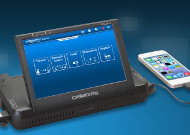11/14/2013
Maryland: Speed Camera Cash Used To Shock, Shoot And Spy On DriversTasers, Glocks and cell phone spying device bought with speed camera profit in Salisbury, Maryland.

Under Maryland law, jurisdictions that operate speed cameras face strict limits on how much revenue can be generated and what local officials can buy with the money. Last month, the city council in Salisbury voted unanimously to take the automated ticketing cash and buy Glock training handguns, Tasers and a device that police can use to crack passwords and download data off the cell phones of motorists during a traffic stop.
Maryland's law autorizing the use of traffic cameras was highly controversial, first passing in 2006 over the veto of then-Governor Robert L. Ehrlich (R). To obtain the needed votes when expanding the speed camera program statewide in 2009, lawmakers agreed to a few compromises. Cities are not allowed to collect more than ten percent of their municipal budget from camera revenue, and profit must go "solely for public safety purposes, including pedestrian safety programs," according to Maryland Code Section 7-302.
In August, the city put in an order for nine Tasers at a cost of $12,500. Last month it approved purchase of eight Glock simunitions handguns and the purchase of a $12,083 mobile device used to crack the passwords and grab the data from mobile phones while in the field.
"The upgrade will allow police investigators to pull data from the most technically advanced cell phones and tablets," Salisbury Police Major David Meienschein wrote in a September 5 memo. "The Cellebrite UFED Touch is a device that is used to perform data extractions from cell phones, tablets, iPads, GPS and other electronic devices. Investigators have been able to obtain stored and deleted data files to include but not limited to: text messages, photographs, videos and contact lists."
Ron Ely, head of the Maryland Drivers Alliance, says this is one of many examples of municipalities are making a mockery of the law.
"The so called 'public safety restriction' is a meaningless joke intended for public relations and has no practical effect," Ely told TheNewspaper. "Salisbury's interpretation of this provision is not surprising at all. Chevy Chase Village previously earmarked such funds on things like new locker rooms, office equipment, cable TV lines, and a new office for the police chief."


